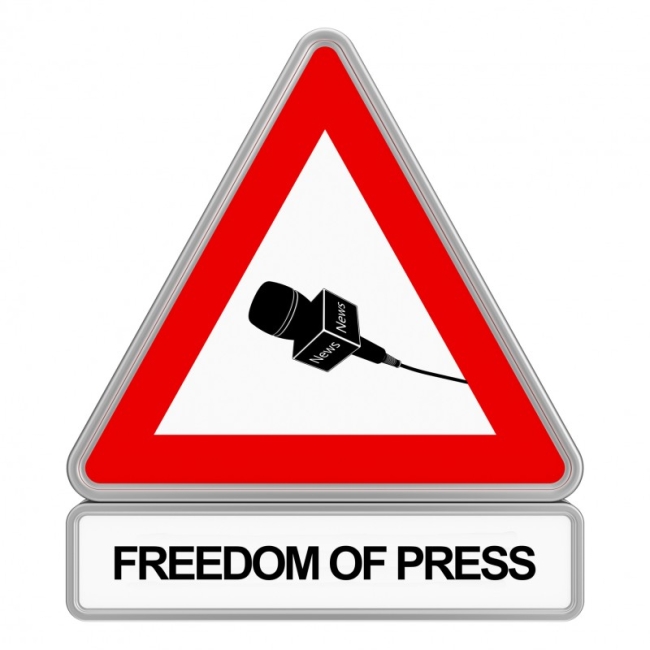You have /5 articles left.
Sign up for a free account or log in.

iStock
President Trump’s attacks on journalists and the media have become routine, and for the most part, journalism schools have stayed quiet.
The president is notorious for his “fake news” remarks during rallies and on Twitter. In October, he praised Greg Gianforte, U.S. representative from Montana, for body-slamming a reporter. Most recently, the White House engaged in a legal battle with CNN after the Trump administration revoked the press pass of Jim Acosta, one of the network’s senior White House correspondents, and accused him of “putting his hands” on a White House staffer during a contentious press conference. Acosta has denied the accusation and believes that his press credentials were revoked because he was asking the president tough questions.
Trump’s disparagement of the press has posed a difficult question for reporters and journalism schools: Should journalists, and the colleges that train them, publicly condemn the president’s attitudes toward media, or should they stay neutral in an effort to focus on reporting the news instead of becoming the news?
The Acosta incident seemed to be the tipping point for many. On Friday, deans from 10 prominent journalism schools signed a letter condemning the White House’s revocation of Acosta’s press pass and other “alarming attacks on the press.”
“Although gratuitous, harsh and insulting reprimands directed at reporters and news organizations that pose inconvenient questions are routine under this administration, the Acosta incident crosses an important line regarding First Amendment protections and press freedom,” the statement read. “Prohibiting White House access to punish a reporter for asking vexing questions of significant public concern resembles the act of an autocrat, not the chief of state of a constitutional republic. The president’s actions against Acosta seem clearly intended to warn other journalists: if you question governmental actions and sayings, the same might happen to you. Play it safe: sit down and be quiet.”
Deans from journalism schools at the University of California, Berkeley; City University of New York; Temple University; Syracuse University; Columbia University; the University of Maryland; Boston University; the University of Texas at Austin; the University of Southern California and Northwestern University signed the letter.
A week before the joint letter was sent, Charles Whitaker, interim dean of the Medill School of Journalism at Northwestern, sent an email to alumni in support of press freedom.
“It is often said that history will judge us not only for what we said and did in times of strife, but also for our silence. It is important, therefore, that those of us who purport to champion and teach the high ideals and responsibilities of journalism raise our voices when one of the most important obligations of our industry -- the duty to speak truth to power -- comes under attack,” Whitaker wrote.
Katherine Chaddock, a retired education professor at the University of South Carolina and an alumna of Medill, was “thrilled” that Whitaker made a statement.
“I sent them back an email right away that said, ‘Thank you, finally, I’ve been waiting for this. I’m so glad that somebody is speaking out,’” she said.
According to a university spokesperson, the email to alumni was the first time Whitaker had spoken publicly on the issue. Speaking out, Chaddock said, isn’t always easy.
“There is fear that ‘oh my gosh, maybe somebody above me or some powerful gift giver doesn’t like hearing this.’ I guess it is hard to speak out,” she said. “Either [press freedom] is a concern of the journalism school or it’s not, and you can’t always worry that there might be some people who feel like this is overstepping the bounds.”
Steve Coll, dean of the Columbia Journalism School, has made many public remarks since Trump was sworn into office, including a statement in April 2017 in which he addressed the threats to journalism from the current presidential administration.
“From day to day, we know that our mission is to get right back to doing our jobs, reporting hard and fairly on all of those who exercise power in our government and economy. Yet when President Donald Trump publicly referred to journalists as ‘enemies of the people’ and then repeatedly called them ‘dishonest’ or ‘dishonorable,’ he crossed into new territory for an American president, at least in the postwar period,” Coll said in his address. “With such language, the president is evidently seeking to delegitimize the place of an independent, professional press in our constitutional system, for the purpose of weakening it. We must all recognize and resist this attack.”
Michael Bugeja, a media ethics professor at Iowa State University's Greenlee School of Journalism and Communication, has reflected on how the current media landscape affects his teaching. His students use a discussion app to have private conversations about the current state of journalism.
“We are operating in a very contentious and partisan climate on First Amendment issues, reporting issues, the fabrications that we have to explore and provide fact to rectify and refute. It’s a very difficult time because I believe social mores are starting to change, not only in journalism, but in the country as well, on how reporting is perceived," Bugeja added.
Despite increased hostility toward the press, Paul Glader, director of the journalism program at King’s College in New York, said he’s noticed his students' interest in the profession continuing to rise.
“We’re a fast-growing program,” he said. “There’s still a lot of young people who seem to be really excited about the profession.”




